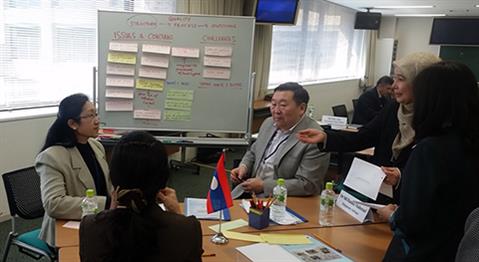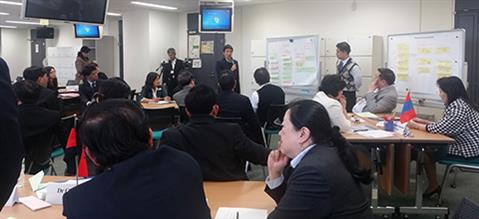
MANILA - Ensuring hospitals deliver quality services and that their patients are safe, are issues of increasing concern in the Western Pacific Region. WHO collaborating centres are key partners in advancing this agenda, bringing expertise and additional resources to share with other countries. WHO collaborating centres equally benefit from providing this support, through an increased international profile and opportunities to better understand issues other countries face.
Acknowledging that in the Western Pacific Region, many senior hospital managers may not have had formal training in quality and patient safety management, WHO has worked with WHO collaborating centres to build managers' skills in these areas.
Three cohorts of senior hospital managers have participated in WHO's Hospital Quality and Patient Safety Management Course since the course was first offered in February 2014. In total, 42 country representatives have participated. Support from WHO collaborating centres has grown with each course offering, from one WHO collaborating centre in 2014, to two centres in 2015 and five centres in 2016.
Dr Clive Tan, WHO Technical Officer (Hospital and Clinical Services) explained how the first forum of WHO collaborating centres in the Western Pacific Region in November 2014 strengthened their partnership: "The first forum gave our team the opportunity to update our collaborating centres on planned activities. Centres that were ready to contribute then contacted us after the forum to see how they could contribute to this course."
The WHO collaborating centres involved in organizing and facilitating the 2016 course were the National Institute of Public Health (NIPH) (Japan) and National Centre for Global Health and Medicine (NCGM) (Japan), with contributions from St Luke's International Hospital and Gunma University. Facilitation support was also provided by Malaysia's Institute of Health Systems Research.
Sixteen senior hospital managers from Cambodia, the Lao People's Democratic Republic, Mongolia and Viet Nam participated in the 2016 course. Two nurses from the WHO Collaborating Centre at Seoul National University Hospital also joined as observers.
The training focused on working with participants to use tools to monitor the quality of hospital care and patient safety, engage individuals, family and communities in health service design and delivery, and develop an action plan to improve quality and patient safety in their hospitals.
Since the course was first delivered, more experts from collaborating centres are supporting as faculty and facilitators, the faculty:participant ratio has increased and the curricula increasingly uses adult-learning and participant-centred delivery approaches, with more discussions, group work and field visits, and less didactic teaching.
Recommendations for WHO from the 2016 course re-enforced the importance of offering learner-centred training facilitated by multi-disciplinary, inter-professional teams and the usefulness of sharing experiences from other countries and institutions to support system changes towards people-centred, integrated care.

Share highlights from your work as a WHO collaborating centre with whoccforum@wpro.who.int to be published on this website

/59748.tmb-300v.png?sfvrsn=9885965b_2)


